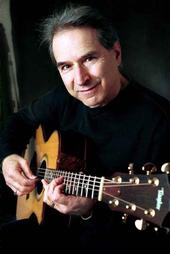Happy Traum began playing guitar and 5-string banjo as a teenager, and was an active participant of the legendary Greenwich Village folk scene of the 1950s and ‘60s. Since then he has performed extensively throughout the U.S., Canada, Europe, Australia, and Japan, both as a soloist and as a member of various groups. His avid interest in traditional and contemporary music has brought him recognition as a performer, writer, editor, session musician, folklorist, teacher, and recording artist.
Happy first appeared on record at a historic session in 1963 when a group of young folk musicians, including Bob Dylan, Phil Ochs, Pete Seeger, Peter LaFarge and The Freedom Singers gathered in Folkways Records' studio for an album called "Broadside, Vol.1." Happy with his group, the New World Singers, cut the first recorded version of "Blowin' In The Wind," and Happy sang a duet with Dylan on his anti-war song "Let Me Die in My Footsteps." (These tracks were re--released in August, 2000 by Smithsonian/Folkways Recordings as part of a boxed set, " The Best of Broadsides ."). Later that year, the New World Singers (Happy, Bob Cohen and Gil Turner) recorded an album for Atlantic Records, with liner notes by Dylan.
In 1965 Happy wrote "Fingerpicking Styles for Guitar," the first of more than a dozen important instruction books which documented the playing of the great traditional guitarists. He also started writing for Sing Out! The Folksong Magazine and, in 1967, he became the magazine's editor, a position which he held for three years. Happy has also written articles and instructional columns for Rolling Stone, Acoustic Guitar, Guitar Player and other music publications.
In 1968, Jane, Happy and their three children moved to Woodstock, NY, and Happy and his brother Artie formed a duet that, according to Rolling Stone, "defined the Northeast folk music style." Their performances at the 1968 and 1969 Newport Folk Festivals helped to gain them an avid following and a contract with famed manager Albert Grossman. In 1970 they recorded their first album for Capitol Records, "Happy And Artie Traum," which The New York Times called "One of the best records in any field of pop music." A second highly praised album, "Double Back," soon followed. Happy and Artie toured extensively throughout the U.S., and in 1972 made their first trip to England to play at the prestigious Cambridge Folk Festival.
"Between them they've been studio musicians, composers, comedians, writers, editors, folklorists, and a host of other things.... A brilliant and unique entity in the world of country-folk music." - The New York Times
In 1971 Happy once again joined Bob Dylan in the studio, playing guitar, banjo, bass, and singing harmony on three songs, which appeared on Bob Dylan's "Greatest Hits, Vol. 2." Dylan also invited Happy to participate in a famous session with poet Allen Ginsberg, which resulted in the box set, "Holy Soul Jelly Roll."
The following year, Happy and Artie produced the classic folk album " Mud Acres, Music Among Friends ," which became a best seller for Rounder Records. In 1974 Happy and Artie cut "Hard Times In The Country," their third duet album, with liner notes by Allen Ginsberg. They subsequently produced and played on three more albums featuring top folk and rock musicians under the collective title The Woodstock Mountains Revue. The core group, comprised of Bill Keith, Jim Rooney, John Herald, Roly Salley, Larry Campbell, Pat Alger, and Happy & Artie Traum, toured the Northeast, Europe and Japan. Other members who appeared on the recordings included John Sebastian, Eric Andersen, Rory Block, Paul Butterfield, Eric Kaz, Lee Berg, Maria Muldaur, Arlen Roth, Caroline Dutton and many others.
Happy recorded his first solo album, “Relax Your Mind,” in 1975 and embarked on the first of many European tours. “American Stranger” was released in 1977 (“An absolute gem...one of the best folk music albums released this year.” - Folk Scene). " Bright Morning Stars " was released in 1980, and "Friends And Neighbors," recorded "live" in a Woodstock concert, was released in 1983. Shanachie Records released a compilation album, “Buckets Of Songs,” in 1988, and “ Bright Morning Stars ” was re-released on CD both in the U.S. and in Japan in 2001.
Although their musical careers have diverged, Happy and Artie continue to perform together at concerts, clubs and festivals. For four years they hosted a popular "live" radio show, "Bring It On Home," which was broadcast monthly from the performance studio at National Public Radio affiliate WAMC in Albany, NY. Sony Records later issued a two-CD set featuring excerpts from “Bring It On Home.” In 1994, Happy and Artie released "Test of Time," their first CD as a duo in many years. As Levon Helm of the Band said: "Their music still flows as natural and clear as a Catskill Mountain stream."
Perhaps Happy's most important and lasting musical contribution has been Homespun Tapes , which he and his wife Jane founded in 1967. This dynamic and growing company has a catalog of more than 500 music lessons on DVD, videotape and CD, and their products are sold around the globe. Taught by top professional performing musicians, the lessons cover a wide variety of instruments and musical styles. Happy produces all of the lessons, and brings to Homespun over 40 years of experience as a guitarist, performer, writer, teacher, and popular member of the music community.
Festival appearances (partial list):
Philadelphia , Newport, Kerrville (Texas), San Diego, Winnipeg, Cambridge (England), National (Australia), Nyon (Switzerland), Kertalg (Brittany, France), Edinburgh (Scotland), Rudolstadt (Germany), Brusella (Belgium), MerleFest (North Carolina), Hudson River Revival.
Guitar workshops (partial list):
Swannanoa Gathering (NC), Augusta Heritage (WV), Telluride Bluegrass (CO), Fur Peace Ranch (OH), Acoustic Guitar Festival (CA), Omega Institute (NY), National Guitar Workshop (CT), International Guitar Seminars (CA), MerleFest (NC), Webnash (NY), Acoustic Guitar Cruise.
